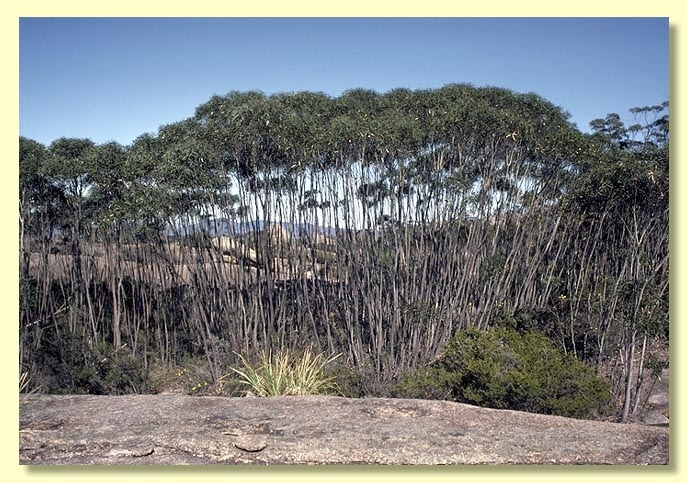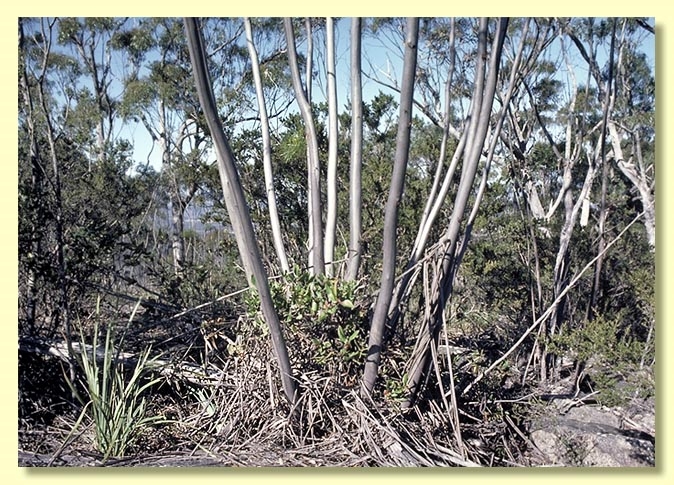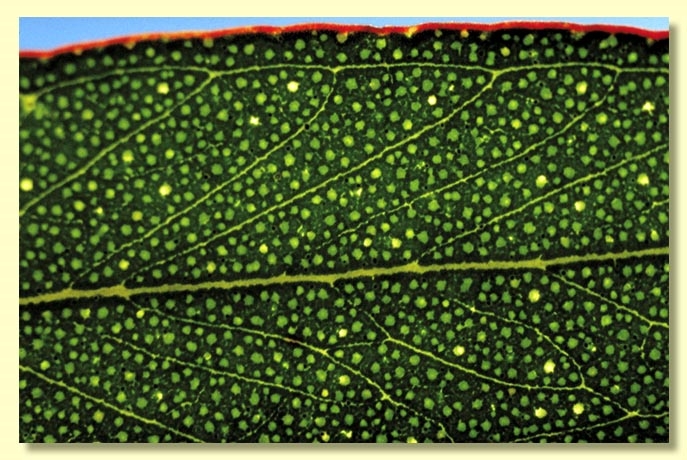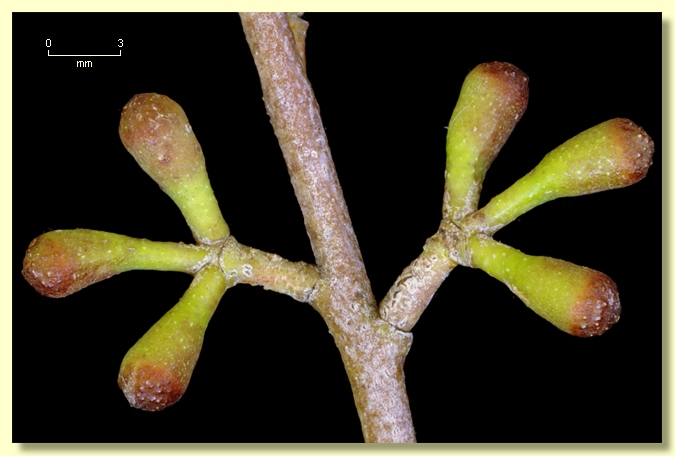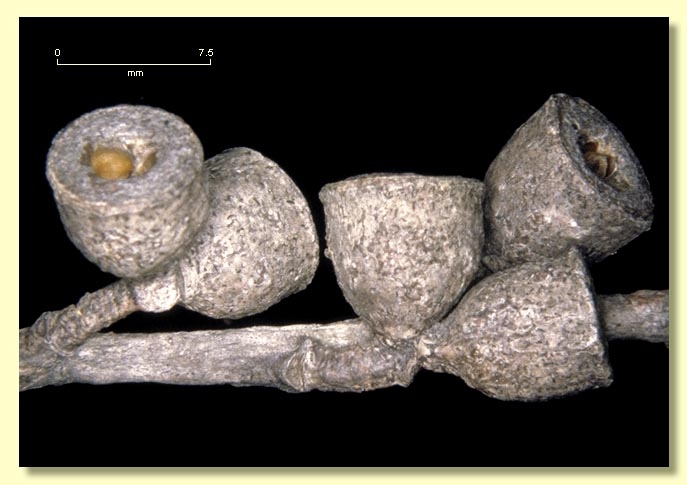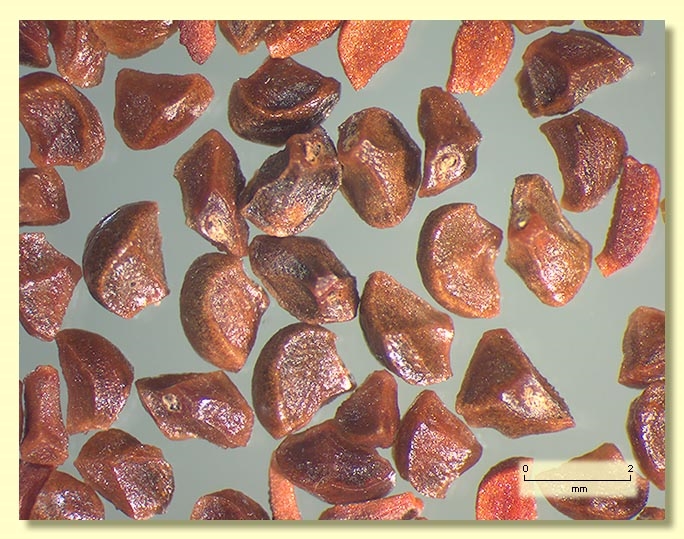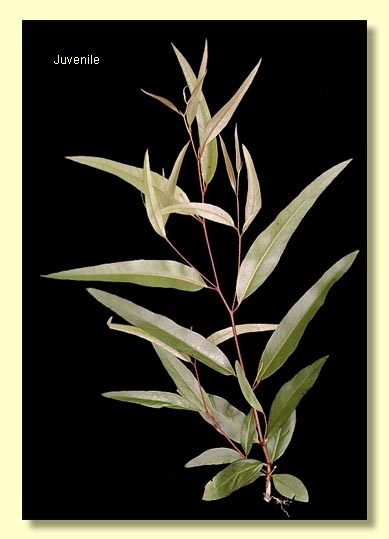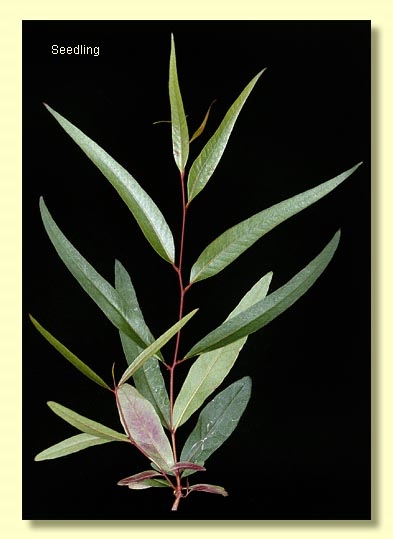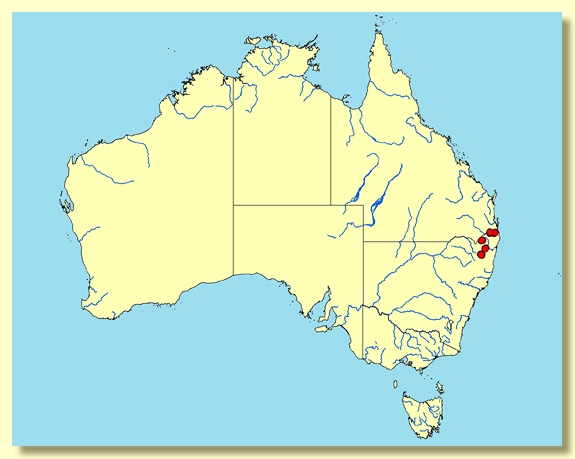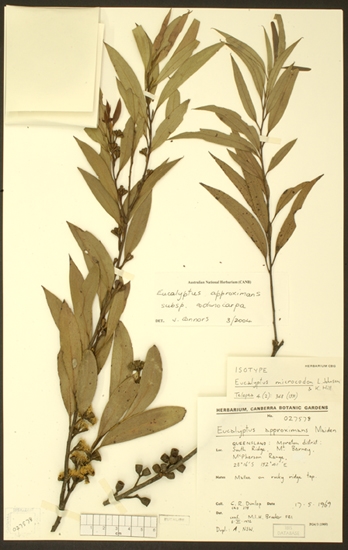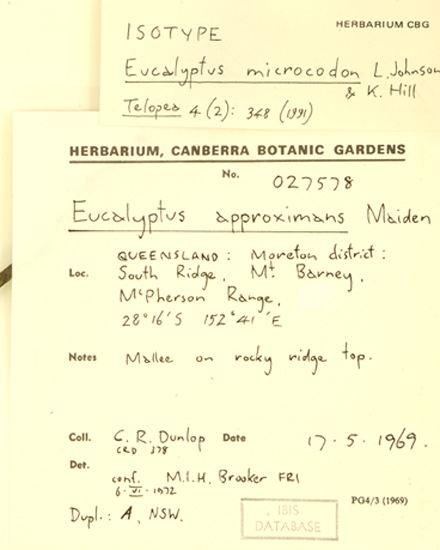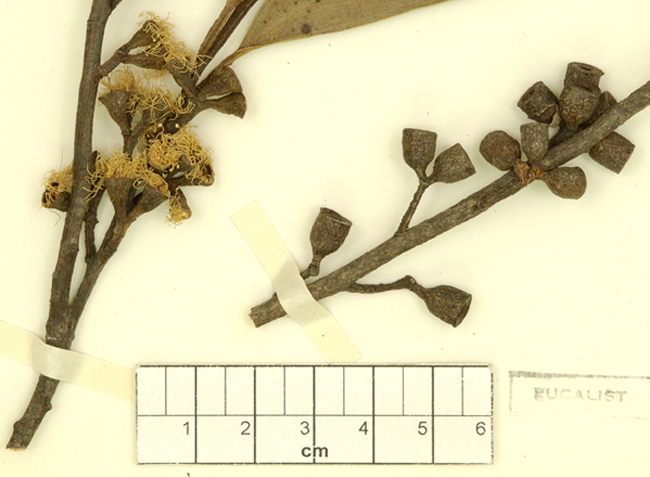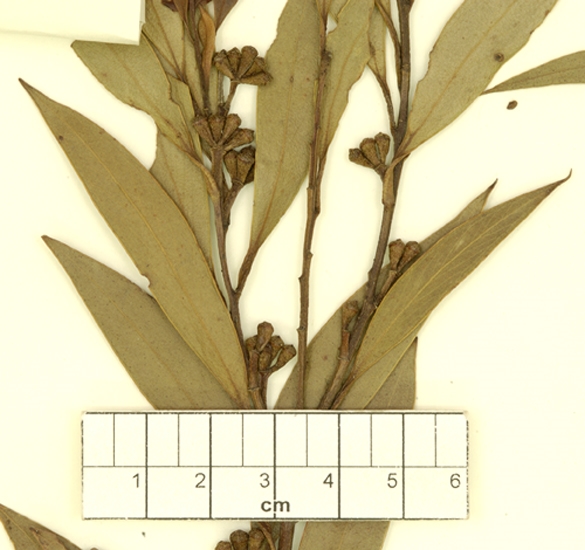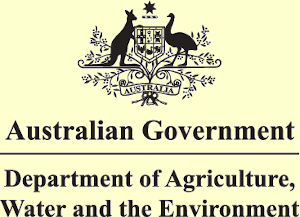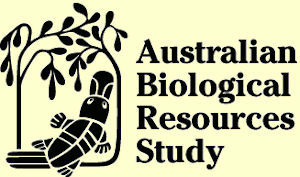Euclid - Online edition
Eucalyptus approximans subsp. codonocarpa
Eucalyptus | Eucalyptus | Eucalyptus | Strictae | Regulares
E. codonocarpa Blakely & McKie, Proc. Linn. Soc. New South Wales 55: 589 (1930). T: Pheasant Mtn, 3.2 km NE of Backwater, NSW, 30 Oct. 1929, E.N.McKie, T.Youman & W.F.Blakely s.n.; holo: NSW; iso: BRI, K, L, MEL.
Slender mallee to 6 m tall. Forming a lignotuber.
Bark smooth, grey, yellow, brown or greenish, occasionally with ribbons of decorticated bark in the upper branches.
Juvenile growth (coppice or field seedlings to 50 cm): stem rounded or square in cross-section, warty on lower internodes; juvenile leaves at first subsessile, opposite for 2 to 5 pairs then alternate, shortly petiolate, narrowly lanceolate to linear, 6.5–14 cm long, 1–2 cm wide, glossy, green.
Adult leaves alternate, petiole 0.5–2 cm long; blade lanceolate to slightly falcate, 6.5–15 cm long, 1–2 cm wide, base oblique or tapering evenly to petiole, margin entire, concolorous, glossy, green, side-veins acute or more or less obscure, reticulation obscure or sparse, intramarginal vein parallel to and well removed from margin, oil glands numerous, island.
Inflorescence axillary unbranched, peduncles 0.4–1 cm long, buds 3(7) per umbel, pedicels 0.1–0.4 cm long. Mature buds clavate, 0.5–0.6 cm long, 0.3–0.4 cm wide, warty, scar absent, operculum rounded to flattened, stamens inflexed or irregularly flexed, anthers reniform to cordate, versatile, dorsifixed, dehiscing by confluent slits, style short or long, locules 3 or 4, the placentae each with 2 vertical ovule rows. Flowers white.
Fruit sessile or pedicellate (pedicels to 0.4 cm long), campanulate, 0.5–0.8 cm long, 0.6–0.9 cm wide, disc level, valves 3 or 4, enclosed.
Seeds pale to mid brown, 1.5–2.8 mm long, pyramidal or obliquely pyramidal, dorsal surface smooth, hilum terminal.
Cultivated seedlings (measured at ca node 10): cotyledons reniform; stems rounded to square in cross-section, warty (feel rough); leaves at first subsessile, opposite for 4 to 5 nodes, then alternate, shortly petiolate, linear to narrowly lanceolate, (6)9–20 cm long, 0.5–2.5 cm wide, tapering at base or oblique, slightly discolorous, very glossy, green.
Flowering has been recorded in March, April and June.
A green-leaved mallee ash species of the Northern Tablelands of New South Wales and adjacent southern Queensland. Eucalyptus approximans has smooth bark and glossy green crown of linear to narrowly lanceolate leaves.
It has more prominently glandular leaves than the southern mallee ashes of Eucalyptus section Eucalyptus series Strictae. Of these, it may be related to the fine-leaved E. cunninghamii of the Blue Mountains and E. paliformis from remote Wadbilliga area of the Southern Tablelands of New South Wales.
There are two subspecies:
E. approximans subsp. approximans
Usually has buds in sevens and cupular to cylindrical fruit and narrow leaves. It is restricted to Barren Mountain near Ebor.
E. approximans subsp. codonocarpa
Has three- and seven-budded inflorescences, cylindric to campanulate fruit and relatively broader leaves. It is known from Pheasant Mountain near Backwater NE of Guyra, the Waratah Trig area, Gibraltar Range National Park NE of Glen Innes, Nightcap Mountain Warra State Forest, Mt Norman and Castle Mountain in the Girraween National Park NE of Wallangarra, Mt Barney and Mt Maroon SW of Beaudesert and the MacPherson Range in the Binna Burra – Dave's Creek area of Lamington National Park. Eucalyptus microcodon was described in 1991 from Mt Barney, Mt Glennie and the Lamington Plateau and is included with subsp. codonocarpa in EUCLID: its distinguishing features, especially bud numbers and fruit dimensions, have been found to differ inconsistently from subsp. codonocarpa. The more subjective differences in leaf width, thickness and relative obscurity of side-veins highlighted by Johnson & Hill (1991) are also a bit variable and dependent the "adultness" of the crown leaves and perhaps position in the crown.
In the classification of Brooker (2000) Eucalyptus approximans belongs in Eucalyptus subgenus Eucalyptus section Eucalyptus series Strictae (9 species in all), because of a combination of characters: mallee habit with smooth bark, alternate, green juvenile leaves, adult leaves held erect and with obscure side-veins and little or no visible reticulation, single axillary inflorescences, the buds in clusters of three or seven, with buds having only one operculum and reniform anthers, ovules in 2 rows, and ± pyramidal seeds. Within series Strictae, E. approximans, E. cunninghamii and E. paliformis form a small group, subseries Regulares, characterised by the leaf oil glands being round in outline.
subsp. codonocarpa: Greek codon, bell and carpos, fruit, referring to the fruit shape.

